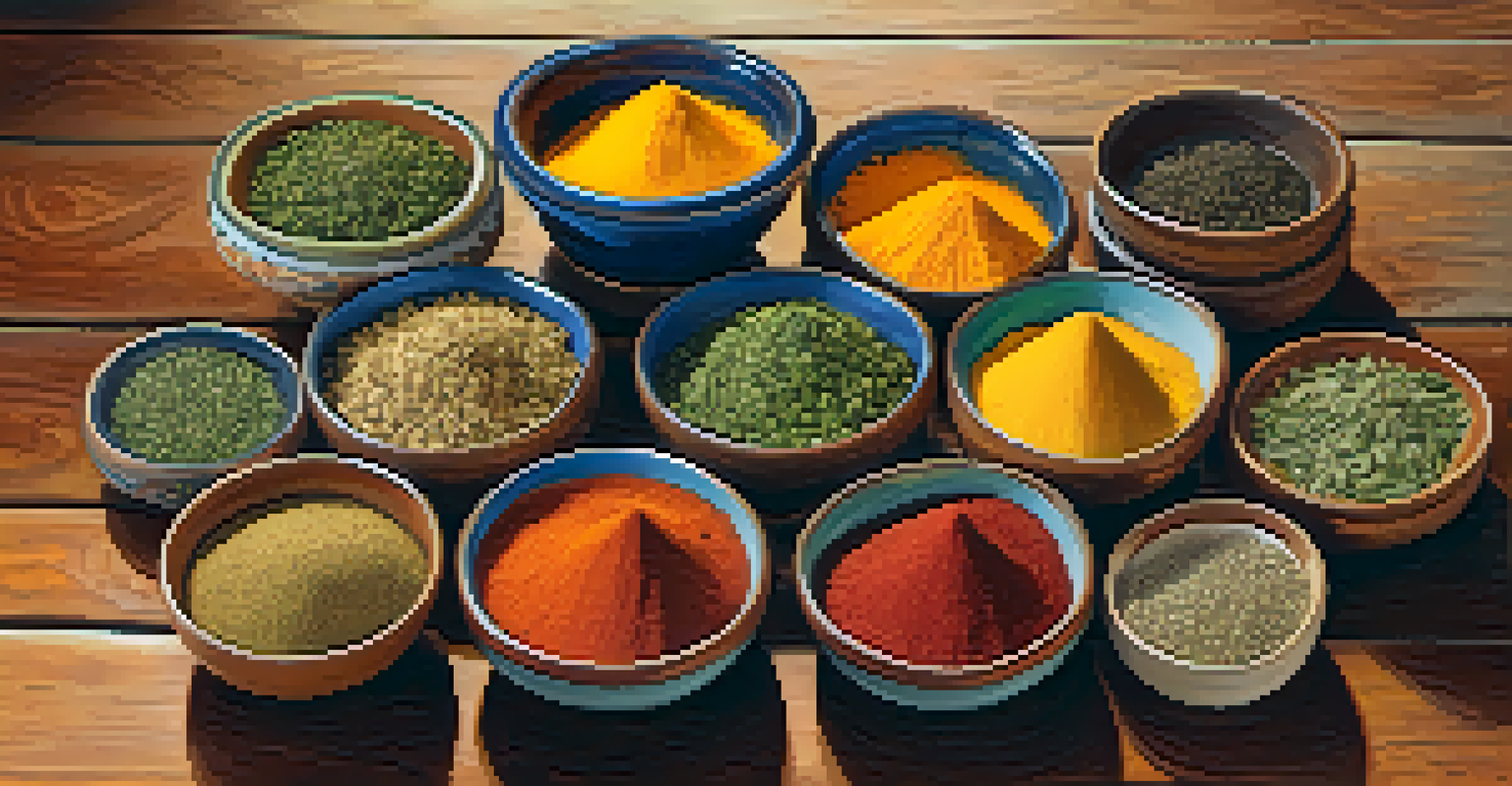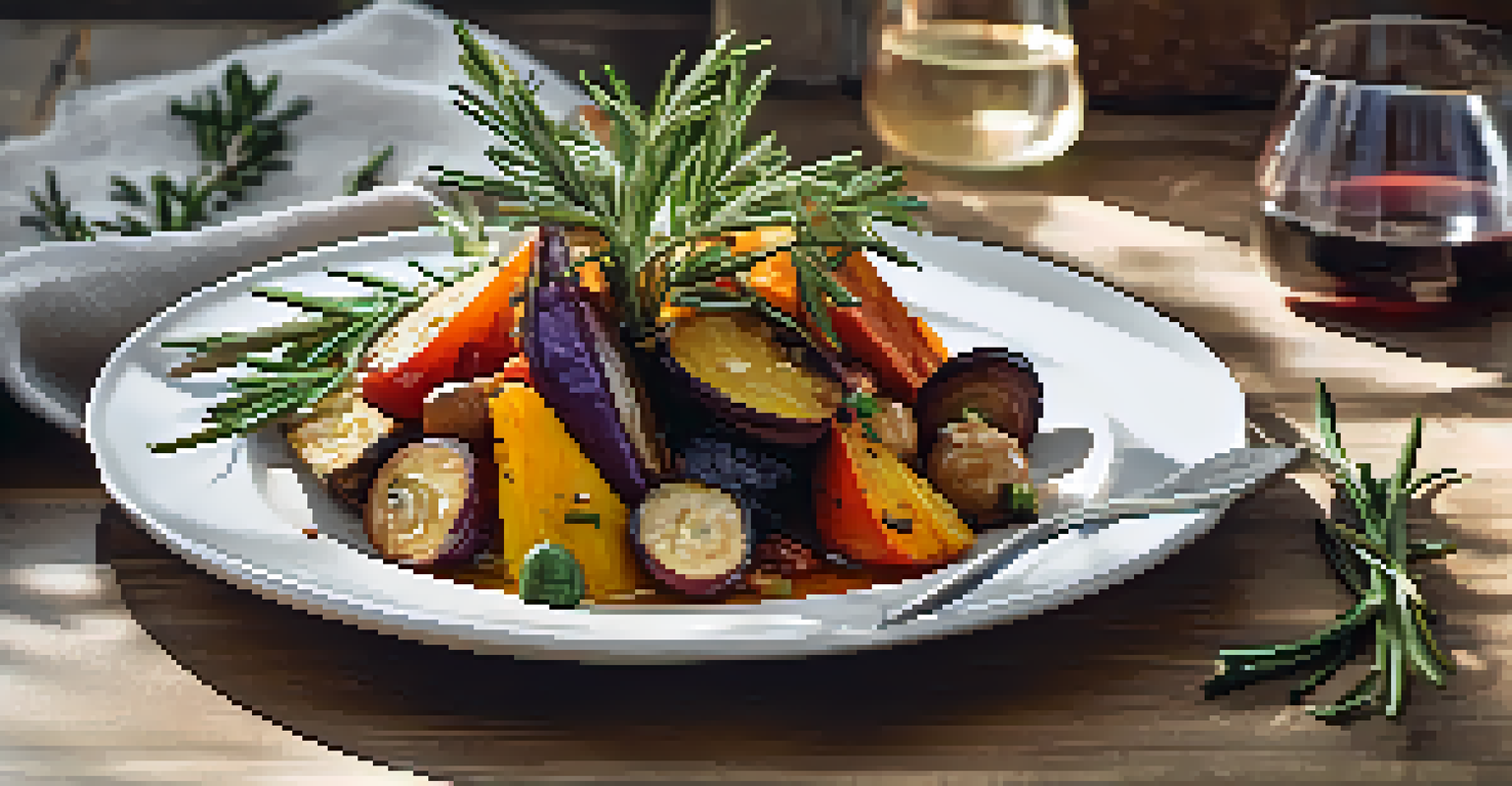Exploring Essential Herbs and Spices for Vegetarian Dishes

The Importance of Herbs and Spices in Vegetarian Cooking
Herbs and spices are the soul of vegetarian cooking, adding layers of flavor that can transform simple dishes into culinary masterpieces. Without the depth that these ingredients provide, vegetarian meals can sometimes seem bland or one-dimensional. By understanding how to incorporate various herbs and spices, you can elevate your meals and delight your taste buds.
Herbs and spices are the most important ingredients in the kitchen. They can transform the ordinary into the extraordinary.
Think of herbs and spices as the paintbrushes of a chef. Just as an artist uses different colors to create a vibrant painting, a cook uses these ingredients to bring dishes to life. Whether it's the earthy notes of cumin or the freshness of basil, each ingredient plays a unique role in building a dish's character.
Moreover, many herbs and spices come with added health benefits, making them not only flavor enhancers but also nutritional powerhouses. This means that by adding them to your meals, you can enjoy a delicious dish while reaping the benefits of their health-boosting properties.
Basil: The Versatile Herb for Every Cuisine
Basil is one of the most beloved herbs around the globe, known for its sweet and slightly peppery flavor. It shines in Mediterranean dishes but is also a star in Asian cuisines, making it incredibly versatile. You can toss fresh basil leaves into salads, blend them into pesto, or use them to garnish soups for a fresh burst of flavor.

This herb is not just about taste; it also brings a range of health benefits. Basil is packed with antioxidants and has anti-inflammatory properties, making it a fantastic addition to your diet. Plus, its delightful aroma can elevate your cooking experience, turning a simple meal into something special.
Herbs and Spices Enhance Flavor
Incorporating various herbs and spices can transform bland vegetarian dishes into flavorful culinary experiences.
To get the most out of basil, consider adding it at the end of the cooking process. This preserves its vibrant flavor and aroma, ensuring that every bite is as fresh as possible. Whether used fresh or dried, basil is a must-have in your vegetarian pantry.
Cilantro: A Fresh Touch for Bold Flavors
Cilantro is a polarizing herb; some adore its fresh, citrusy notes, while others find its flavor overwhelming. Nevertheless, when used thoughtfully, cilantro can add a bright kick to various vegetarian dishes. It pairs beautifully with beans, grains, and fresh vegetables, adding a zesty flair that can liven up any meal.
Cooking is like love. It should be entered into with abandon or not at all.
Beyond its flavor, cilantro is also packed with vitamins A, C, and K, making it a nutritious addition to your dishes. Its unique taste can enhance salsas, salads, and stir-fries, allowing you to explore different flavor profiles. If you're new to cooking with cilantro, start with small amounts and gradually increase until you find the right balance for your palate.
Keep in mind that cilantro is best added just before serving. This helps maintain its vibrant green color and fresh flavor, allowing you to enjoy its full potential in your vegetarian cooking.
Cumin: The Earthy Spice that Adds Depth
Cumin is an earthy spice that often serves as a foundational flavor in many cuisines, particularly in Indian and Middle Eastern dishes. Its warm, nutty notes can enhance everything from lentil soups to vegetable stews, making it a staple in vegetarian cooking. Just a teaspoon of cumin can transform a bland dish into something aromatic and satisfying.
This spice also offers a range of health benefits, including aiding digestion and providing antioxidants. When you incorporate cumin into your meals, you're not only improving flavor but also boosting your overall health. It's one of those ingredients that truly packs a punch with minimal effort.
Health Benefits of Culinary Herbs
Many herbs and spices not only enhance flavor but also offer significant health benefits, making them essential in vegetarian cooking.
For the best flavor, try toasting cumin seeds before adding them to your dishes. This technique releases their essential oils, intensifying their flavor and aroma, and turning your vegetarian meals into a sensory delight.
Oregano: The Classic Herb for Robust Dishes
Oregano is a staple herb that adds a robust flavor to many dishes, especially in Italian and Mediterranean cooking. Its slightly bitter and peppery taste makes it perfect for seasoning tomato-based sauces, roasted vegetables, and even pizza. Oregano's bold flavor means a little goes a long way, making it a cost-effective choice for enhancing your meals.
Not only does oregano taste great, but it's also rich in antioxidants and has antibacterial properties. This means that by using oregano, you can improve both the flavor and nutritional quality of your vegetarian dishes. It's a fantastic way to boost the health benefits of your meals without compromising on taste.
When using oregano, consider whether to use it fresh or dried. Fresh oregano has a more delicate flavor, while dried oregano is more concentrated, so adjust the quantity based on your preference and the dish you're preparing.
Turmeric: The Golden Spice with Health Benefits
Turmeric is known for its vibrant yellow color and is a superstar in many vegetarian recipes, especially in curries and grain bowls. Its warm, slightly bitter flavor pairs well with a variety of vegetables and legumes, making it a versatile ingredient. Beyond its flavor, turmeric is celebrated for its anti-inflammatory properties and potential health benefits, particularly due to its active compound, curcumin.
Incorporating turmeric into your meals can be as simple as adding a teaspoon to your cooking. This not only enhances flavor but also gives your dish a beautiful golden hue, making it visually appealing. Its versatility means it can be added to soups, smoothies, or even used to create a vibrant rice dish.
Versatile Ingredients for Every Dish
Herbs like basil, cilantro, and spices like cumin and turmeric provide versatility, allowing cooks to explore diverse flavor profiles in their meals.
For optimal absorption of curcumin, consider pairing turmeric with black pepper. This combination enhances the spice's bioavailability, allowing you to enjoy its health benefits more effectively while savoring its unique flavor.
Rosemary: The Aromatic Herb for Flavorful Dishes
Rosemary is an aromatic herb that brings a distinct pine-like flavor to your vegetarian dishes. It's particularly great for roasting vegetables, flavoring grains, and adding depth to sauces. Its robust flavor means that even a small amount can significantly impact your meal, making it a fantastic ingredient to have on hand.
Beyond its culinary uses, rosemary is rich in antioxidants and has been linked to improved digestion and memory. Incorporating this herb into your cooking not only enhances flavor but also provides added health benefits. It’s a win-win for your taste buds and your well-being.

When using rosemary, consider using fresh leaves for a more pronounced flavor. You can chop them finely or toss whole sprigs into soups and stews, allowing their essence to infuse the dish. Just remember to remove the sprigs before serving to avoid a woody texture.
Ginger: The Zesty Root for a Flavor Kick
Ginger is a zesty root that adds warmth and spiciness to a variety of vegetarian dishes. It’s commonly used in Asian cuisine but can be incorporated into sauces, marinades, and even baked goods for a delightful flavor kick. Its versatility makes it an essential ingredient to keep in your pantry.
In addition to its flavor, ginger is well-known for its digestive health benefits and anti-inflammatory properties. Adding ginger to your meals not only enhances taste but also supports your overall wellness. A little ginger can go a long way, making it a powerful addition to your vegetarian cooking arsenal.
For the best flavor, use fresh ginger whenever possible. You can grate it, slice it, or even use it in its juiced form to amplify your dishes. Just be cautious with the amount, as its potent flavor can easily overpower other ingredients if used excessively.